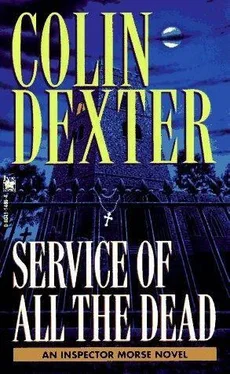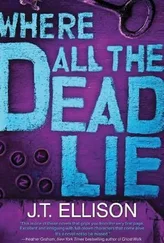Colin Dexter - Service of all the dead
Здесь есть возможность читать онлайн «Colin Dexter - Service of all the dead» весь текст электронной книги совершенно бесплатно (целиком полную версию без сокращений). В некоторых случаях можно слушать аудио, скачать через торрент в формате fb2 и присутствует краткое содержание. Жанр: Триллер, на английском языке. Описание произведения, (предисловие) а так же отзывы посетителей доступны на портале библиотеки ЛибКат.
- Название:Service of all the dead
- Автор:
- Жанр:
- Год:неизвестен
- ISBN:нет данных
- Рейтинг книги:3 / 5. Голосов: 1
-
Избранное:Добавить в избранное
- Отзывы:
-
Ваша оценка:
- 60
- 1
- 2
- 3
- 4
- 5
Service of all the dead: краткое содержание, описание и аннотация
Предлагаем к чтению аннотацию, описание, краткое содержание или предисловие (зависит от того, что написал сам автор книги «Service of all the dead»). Если вы не нашли необходимую информацию о книге — напишите в комментариях, мы постараемся отыскать её.
Service of all the dead — читать онлайн бесплатно полную книгу (весь текст) целиком
Ниже представлен текст книги, разбитый по страницам. Система сохранения места последней прочитанной страницы, позволяет с удобством читать онлайн бесплатно книгу «Service of all the dead», без необходимости каждый раз заново искать на чём Вы остановились. Поставьте закладку, и сможете в любой момент перейти на страницу, на которой закончили чтение.
Интервал:
Закладка:
'Was he very disappointed?'
The old man eyed Morse shrewdly and relit his pipe before replying. 'What do you think, Inspector?'
Morse shrugged his shoulders as if the matter were barely of consequence. 'You said he was ambitious, that's all.'
'Yes,' replied the old man slowly.
'So he stayed on another year?'
'Yes.'
Lewis shuffled a little uncomfortably in his chair. At this rate of progress they wouldn't be home before midnight. It was as if Morse and Meyer were at the snooker table, each of them playing his safety shots. Your turn, Morse.
'He took his Higher again?'
Meyer nodded. 'He didn't do quite so well as in the previous year, if I remember rightly. But that is not unusual.'
'You mean he was more worried about preparing for his Oxford entrance?'
'That was probably the reason.'
'But he didn't make it to Oxford?'
'Er – no.'
Something seemed to be puzzling Morse, Lewis could see that. Was he on to something? But it appeared not. Morse had got to his feet and was pulling on his coat. 'Nothing else you can tell me about him?'
Meyer shook his head and prepared to see his visitors out. He was a short man, and now well over eighty; yet there was still an air of authority in his bearing, and Lewis could well understand (what he'd heard earlier in the day) that Meyer had ruled his school with a rod of iron, and that pupils and staff alike had trembled at his coming.
'Nothing at all?' repeated Morse as they stood at the door.
'There's nothing more I can tell you, no.'
Was there slightly more emphasis on the 'can' than there need have been? Lewis wasn't sure. He was lost as usual anyway.
For the first part of their return journey, Morse seemed rapt in thought; and when he finally did say something Lewis could only wonder what those thoughts had been.
'What was the exact day when Lionel Lawson left school?'
Lewis looked through his notebook. 'November the eighth.'
'Mm.' Morse nodded slowly. 'Tell me when you spot a phone-box.'
When, ten minutes later, Morse got back into the car, Lewis could see that he was very pleased with himself.
'Are you letting me in on this one, sir?'
'Of course!' Morse looked sideways at his sergeant in mild surprise. 'We're partners, aren't we? We do things together, you and me. Or "you and I", as I've no doubt old man Meyer would say. You see, young Lionel Lawson was an ambitious little swot, right? He's not been over-endowed by the Almighty with all that much up top, but he makes up for it by sheer hard work. More than anything else he wants to go up to Oxford. And why not? It's a fine ambition. Let's just recap on Master Lionel, then. He tries once – and he fails. But he's a sticker. He stays on for another year – another year of grind on his set books and the rest of it, and all the time he's being groomed by his masters for his entrance exam. I shouldn't think he's too bothered about not doing so well in his other exams that summer – he's set his sights on higher things. Remember he's already done three years in the sixth form, and he goes back in the autumn term because that's when the entrance exams are always taken. He's all ready for the final furlong – agreed?'
'But he didn't make it.'
'No, you're right. But he didn't fail to get in, Lewis – and that's the interesting point. Lawson, L., left school on November the eighth, you tell me. And I'll tell you something. That year the entrance papers were sat in the first week of December – I just rang up the Registry at Oxford – and Lawson, L., didn't sit the examination.'
'Perhaps he changed his mind.'
'And perhaps somebody changed it for him!'
A light flickered dimly in the darkness of Lewis' mind. 'He was expelled, you mean?'
'That's about it, I reckon. And that's why old man Meyer was so cagey. He knew a good deal more than he was prepared to tell us.'
'But we have no real evidence-'
'Evidence? No, we haven't. But you've got to use a bit of imagination in this job, Lewis, haven't you? So let's use a bit. Tell me. Why do boys usually get expelled from public schools?'
'Drugs?'
'They had no drugs in those days.'
'I don't know, sir. I never went to a public school, did I? There was none of that Greek and Latin stuff for me. We had enough trouble with the three Rs.'
'It's not the three Rs we're worried about now, Lewis. It's the three Bs: bullying, beating and buggery! And Lawson, L., from what we've learned of him, was a quietly behaved little chap, and I doubt he got expelled for bullying or beating. What do you think?'
Lewis shook his head sadly: he'd heard this sort of thing before. 'You can't just – you can't just make up these things as you go along, sir. It's not fair!'
'As you wish.' Morse shrugged his shoulders, and the needle on the speedometer touched 90 m.p.h. as the Jaguar skirted Northampton on the eastern by-pass.
Chapter Nineteen
Back in Oxford at about 4.30 p.m. that same afternoon, two men were walking slowly down Queen Street from Carfax. The elder, and slightly the taller of the two, a growth of greyish stubble matting his long vacant face, was dressed in an old blue pin-striped suit which hung loosely on his narrow frame. In his right hand he carried a bull-necked flagon of Woodpecker cider. The younger man, bearded and unkempt, anywhere in age (it seemed) between his mid-forties and mid-fifties, wore a long army-issue greatcoat, buttoned up to the neck, its insignia long since stripped off or lost. He carried nothing.
At Bonn Square they turned into the circle of grass that surrounds the stone cenotaph, and sat down on a green-painted bench beneath one of the great trees girdling the tiny park. Beside the bench was a wire waste-paper basket, from which the younger man pulled out a copy of the previous day's edition of the Oxford Mail. The elder man unscrewed the liquor with great deliberation and, having taken a short swig of its contents, wiped the neck of the bottle on his jacket sleeve before passing it over. 'Anything in the paper?'
'Nah.'
Shoppers continuously criss-crossed one another in the pedestrian precinct in front of the park, many of them making their way down the covered arcade between the light-beige brickwork of the Selfridges building and the duller municipal stone of the public library. A few casual glances swept the only two people seated on the park-benches – glances without pity, interest or concern. Lights suddenly blazed on in the multi-storeyed blocks around and the evening was ushered in.
'Let's look at it when you've finished,' said the elder man, and immediately, without comment, the paper changed hands. The bottle, too, was passed over, almost rhythmically, between them, neither man drinking more than a mouthful at a time.
'This is what they were talking about at the hostel.' The elder man pointed a thin grubby finger at an article on the front page, but his companion made no comment, staring down at the paving-stones.
'They've found some fellow up the top of that tower, you know, just opposite- ' But he couldn't quite remember what it was opposite to, and his voice trailed off as he slowly finished the article. 'Poor sod!' he said finally.
'We're all poor sods,' rejoined the other. He was seldom known to communicate his thoughts so fully, and he left it at that, hunching himself down into his greatcoat, taking a tin of shredded tobacco from one of its large pockets and beginning to roll himself a cigarette.
'P'haps you weren't here then, but a fellow got hisself murdered there last – when was it now? – last… Augh! Me memory's going. Anyway, a few days later the minister there, he chucks hisself off the bloody tower! Makes you think.'
But it was not apparent that the younger man was given cause to think in any way. He licked the white cigarette-paper from left to right, repeated the process, and stuck the ill-fashioned cylinder between his lips.
Читать дальшеИнтервал:
Закладка:
Похожие книги на «Service of all the dead»
Представляем Вашему вниманию похожие книги на «Service of all the dead» списком для выбора. Мы отобрали схожую по названию и смыслу литературу в надежде предоставить читателям больше вариантов отыскать новые, интересные, ещё непрочитанные произведения.
Обсуждение, отзывы о книге «Service of all the dead» и просто собственные мнения читателей. Оставьте ваши комментарии, напишите, что Вы думаете о произведении, его смысле или главных героях. Укажите что конкретно понравилось, а что нет, и почему Вы так считаете.












